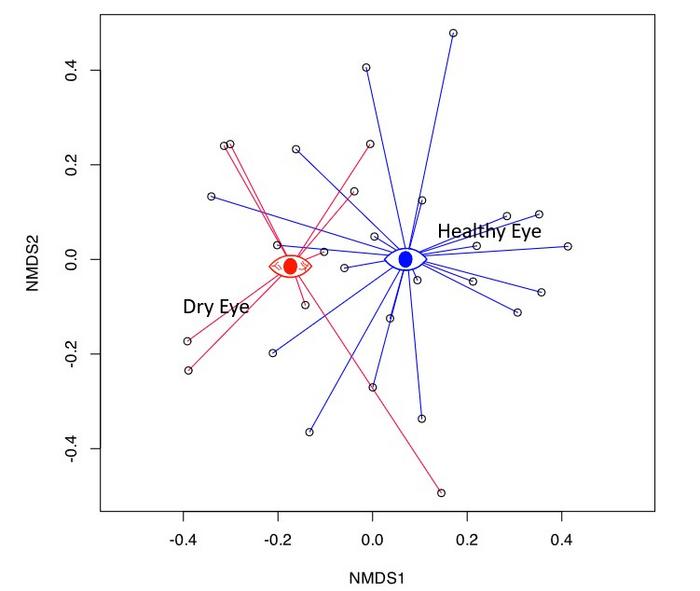Researchers have used advanced sequencing technology to determine how the mix of microbes present in patients with healthy eyes differs from the mix found in patients with dry eye. The new work could lead to improved treatments for various eye problems and for diseases affecting other parts of the body.

Credit: Pallavi Sharma, Stephen F. Austin State University
Researchers have used advanced sequencing technology to determine how the mix of microbes present in patients with healthy eyes differs from the mix found in patients with dry eye. The new work could lead to improved treatments for various eye problems and for diseases affecting other parts of the body.
Microbial communities in and on our body — collectively referred to as the human microbiota — play an essential role in keeping us healthy. Although many studies have focused on microbial communities in our gut, understanding the microbiota present in other body sites is critical for advancing our knowledge of human health and developing targeted interventions for disease prevention and treatment.
“Once we understand the eye microbiota properly, it will improve disease diagnosis at an early stage,” said research team leader Alexandra Van Kley, a professor at Stephen F. Austin State University in Nacogdoches, Texas. “This knowledge can also serve as a catalyst for developing innovative therapies aimed at preventing and treating ocular disease as well as those that affect the central microbiome site: the gut.”
Pallavi Sharma, a graduate student in Van Kley’s lab, will present the research at Discover BMB, the annual meeting of the American Society for Biochemistry and Molecular Biology, which will be held March 23–26 in San Antonio.
“Human microbiome research suggests a strong connection between the gut microbiome and the brain and eyes,” said Sharma. “Any alteration in the gut microbiome affects other organs and can lead to disease. Therefore, we are trying to identify patterns of an imbalance between the types of microbes present in a person’s ocular microbiome for people with different health problems.”
For the study, the researchers collected eye samples from 30 volunteers using a swab and then performed 16S rRNA sequencing and bioinformatic analysis to determine the microbiome distribution for patients with healthy eyes and those with dry eyes.
The analysis showed that Streptococcus and Pedobacter bacteria species were the most prevalent microbes in healthy eyes while more Acinetobacter species were present in the eye microbiomes of people with dry eye. “We think the metabolites produced by these bacteria are responsible for dry eye conditions,” said Sharma. “We are performing further research to understand the metabolic pathways associated with the Acinetobacter to better understand the disease.”
Next, the researchers would like to explore the gut microbiome of the patients with dry eye to better understand how it related to the eye microbe differences they observed.
Pallavi Sharma will present this research during a poster session from 4:30 to 6:30 p.m. CDT on Tuesday, March 26, in the exhibit hall of the Henry B. González Convention Center (Poster Board No. 277) (abstract). Contact the media team for more information or to obtain a free press pass to attend the meeting.
Note: Alexandra Van Kley is listed in the Discover BMB schedule as the presenter, but Pallavi Sharma will be presenting this work.
Image available.
About the American Society for Biochemistry and Molecular Biology (ASBMB)
The ASBMB is a nonprofit scientific and educational organization with more than 12,000 members worldwide. Founded in 1906 to advance the science of biochemistry and molecular biology, the society publishes three peer-reviewed journals, advocates for funding of basic research and education, supports science education at all levels, and promotes the diversity of individuals entering the scientific workforce. www.asbmb.org
Find more news briefs and tipsheets at: https://discoverbmb.asbmb.org/newsroom.
###




